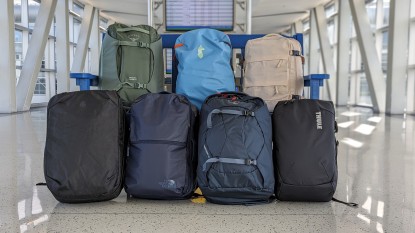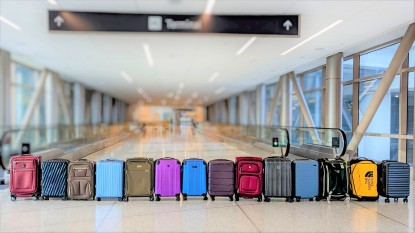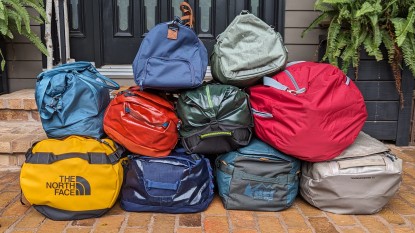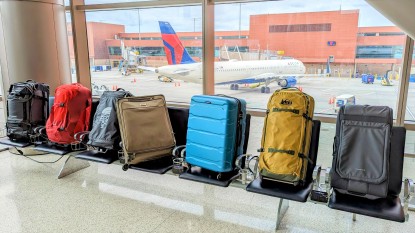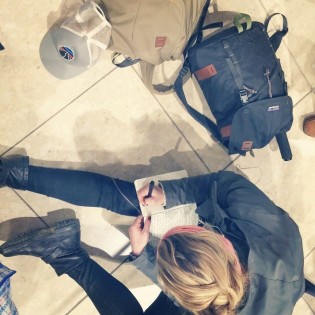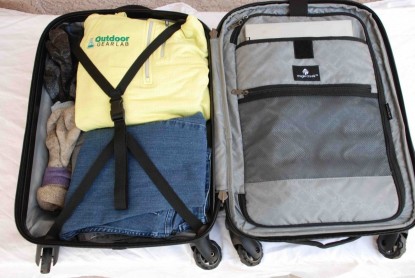Can You Live in a Hotel?
Living in a hotel used to only be for the rich and eccentric on the luxury spectrum and the poor eccentric on the other. Howard Hughes and Marilyn Monroe were on one side and on the other were transients in the worst parts of town. But as travel has become more affordable and accessible, a new group has emerged: those with a flexible work schedule who wants to live simply and see the world.
This article is not for someone who wants to live full-time at the Beverly Hills hotel. It's also not for a family of four or someone who needs to show up at the office 9-5 every week. Instead, it's for someone (or a couple) who wants to see as much of the world as possible and live in as many different places as possible within a reasonable budget. In short: the growing number of traveling contractors who would rather live in the city they work in rather than commute back and forth to an expensive apartment rarely get to appreciate. It can cost less to live in hotels and travel than to live in San Francisco, New York, or many other desirable but outlandishly expensive cities (see the cost estimates below).
How to Live in a Hotel
1. Get Rid of Everything You Have Not Used in a Year
Do this even if you don't want to live in a hotel. If you haven't used it in a year, there is a 99 percent chance you don't need it. Those items are sucking up your money and/or mental energy to store. Go to eBay, look up the item's value in recently completed auctions and decide if you want to sell the item or give it away. We wrote this online charity auction guide, which has our eBay tips. If it's not worth selling, give it away to your favorite non-profit. Or give to a friend.
Still not convinced you can or should get rid of all that stuff?2. Establish a Home Base… or Don't
Even if you live in a hotel most of the time,
3. Negotiate for a Long-term Rate
There are two approaches to living in a hotel: negotiate with the hotel for a great long-term rate or book last minute. You probably want to negotiate if you are staying somewhere longer than a week.
4. Use Apps, Not Web Sites, to Find Hotel DealsApps like HotelTonight and Hotels.com offer better rates than websites. For example, often the Hotels.com app finds prices 10-25 percent less than on the Hotels.com website. Discounts range from 10-80 percent off the published rate.
5. Paperless Billing and Mail Forwarding Switch to paperless billing even if you're not living out of a hotel. There usually is still some mail that can't be paperless (IRS, tickets — you know, the fun stuff). For that, the USPS has a Premium Forwarding Service for $18 a week that will forward your weekly mail anywhere.
6. Use the Hotel GymOne of the few downsides to constant travel is that it's easy to let
7. Use the Front Desk
Not only does the front desk have extra adapters, toothbrushes and misc. supplies, they often can point you toward the best places to see and eat nearby that may be buried in Yelp or your maps app. For bar and nightlife recommendations, ask the hotel bartender for the name of their favorite place.
8. Get Uber and an Electric ScooterCost to Live in a Hotel
The short answer: living in a hotel is as expensive as you make it. It can be less expensive or more expensive than renting an apartment, depending on your standard of living and how you are able to deduct expenses.
At first, living in a hotel may seem expensive. For example, on average you spend $150 a night on hotels (which in 2022 gets you a pretty nice room if you use deal apps like Hotel Tonight). That would be $4500 a month, which is super expensive for most people. But once you start living in hotels, you travel more and spend more nights visiting friends, camping, staying with a significant other at their house, getting free nights on rewards. On average, I only actually stay in a hotel about half that time, so now I'm at $2250 a month.
Now look at all the money saved each month by not renting a place:$50 - gas and electric
$25 - garbage and water
$100 - TV, cable , internet
$100 - basic living and cleaning supplies, replacing sheets, towels, laundry detergent, etc.
$50 - house cleaning
$100-200 - furnishings (assuming most people spend $1200-2400 a year on furnishings)
Add all that to your $1500 a month, and you are getting closer to the $2250 number.
If you have read this far, you also like to travel. So you're probably renting hotel rooms, say, on average, two nights a month at $150 a night. Now you are well past that $2250 number.
Now consider that living in a hotel may be largely tax-deductible if it's work-related. Depending on your tax bracket, this adds another 15-35 percent discount to your hotel stay. That average price of $150 a night might only be $100 a night if it's deductible. Tax deductions to your rental apartment are generally limited to the relatively small percentage you can justify as a home office.
Finally, if you're staying in hotels most of the time, you probably don't need a car. Not having a car is a bigger cost and time savings than most people think. Depreciation, gas, and insurance are the biggest costs. But many people underestimate the little costs that also add up: parking, parking tickets, car washes, repairs, oil changes, accidents, registration. More importantly, not having a car generally saves you time - a LOT of time.
Time Savings of Living in Hotel
The above calculation of the costs will vary wildly based on your standard of living and other factors. What is more constant is the time savings of hotel living. You never or rarely have to:
- make your bed This pack makes us happy! We love traveling, and this pack has what it takes to take us pretty much anywhere.Credit: Jeremy Bauman
- wash your sheets
- do dishes
- do laundry Travel packs are soo exciting! When you get a good fit, many of these packs were super comfortable. The Quantum 70 seen here features shoulder straps that adjust vertically to fit nearly any back length.Credit: Jeremy Bauman
- clean your house or organize someone else to do it
- shop for house supplies, bedding, etc. (and track down deliveries)
- shop for home furnishings or art (and wait for the delivery truck or assemble the furniture)
- maintain plants or a yard
Overall, hotel living is not for most people. But if you don't have kids, have a flexible work schedule, and can work from anywhere, it's much more appealing than furnishing an apartment in an expensive city. You save time, can potentially save money, and get to live in potentially very lovely and different surroundings. Finally, the most significant benefit to hotel living: you just get out more! You get out of the routines that make life fly by too fast. Instead, you make more memories, go on more adventures and meet more people. If you have the opportunity - try it!
Other Articles You Might Enjoy
Our Mobile Office Set-Up
Travel Tips - How to Get Around the World with Less Stress and Logistics
The best luggage for extended travel
The Ultimate Packing Checklist











